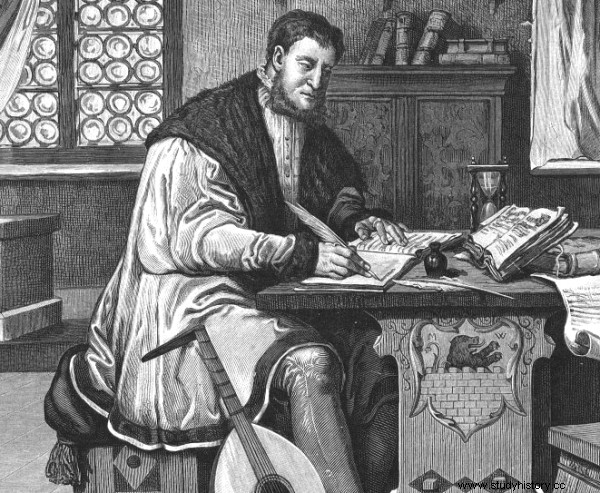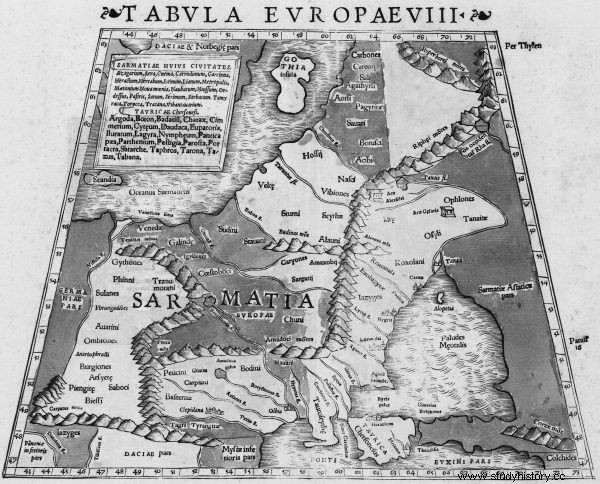The obsession with searching for ancient roots, which in the 16th century took over the Polish nobility, led to the creation of an entire ideology. But the Sarmatians of the Vistula River were not satisfied that they themselves believed in it. To convince the rest of the world, they put forward a series of arguments. Mostly completely sucked out of the finger.
"Poland is perfect from everywhere, so that no one can benefit or capture it," wrote Stanisław Orzechowski in 1566. His opinion at that time was shared by the majority of his countrymen. Or at least those who prided themselves on noble origins.
Such an ideal country needed a proper history. The best going back and described in the most important book of the Christian world - the Bible. There was only one problem. The Holy Scripture did not even mention a word about Poles.
It's good to be a Sarmatian
And there was a solution to that. "Because the name Polonia was missing in the Bible and among ancient historians , so the arguments about Poland and the Slavic region were associated with the brave people of the Sarmatians (Sauromats) "- explains Jerzy Besala in the book" How Poland saved the world ".
Interestingly, it is in vain to look for Sarmatian roots in the oldest Polish chronicles. Wincenty, known as Kadłubek, does not mention Sarmatia at all. Gall Anonym used this word only once - to describe the Baltic tribe of Prussia. However, this did not prevent their successors.
Jan Długosz saw in his "Annales" the sources of "the famous Kingdom of Poland" in the times of the biblical Flood and the Tower of Babel. According to him, the Slavs were descendants of Japheth, son of Noah. The court historian was applauded by Marcin Bielski in the Chronicle of Everything World, published in 1551. He himself proved that Alexander the Great had already given Poles the right to the lands they occupied - the so-called European Sarmatia.

Marcin Bielski argued that the Slavs got the privilege of governing the area they lived from Alexander the Great.
Equally breakneck theses were put forward by the 16th-century historian, Calvinist Stanisław Sarnicki. Besala in the book "How Poland saved the world" assigns him a significant role in the dissemination of Sarmatian ideology:
Sarnicki managed to create a »dustbin of Polish historiography«. Despite these opinions, Sarnicki's work significantly strengthened the awareness of the nobility. It strengthened the belief in the exceptional, missionary and mystical role of the noble Sarmatians, preparing the ground for Polish and Slavic messianisms, i.e. the Sarmatian mission.
Poland is the king of the world
Father Wojciech Dębołęcki went a step further. He decided to prove that the Republic of Poland is - due to its ancient roots - destined to rule other countries and nations.
The clergyman summed up his views in a treatise with an intriguing title, published in 1633:"Reference of the world's only state, in which Father Wojciech Dębołęcki shows that the most ancient in Europe, the Kingdom of Poland alone in the world has the only succesors of Jadam, Seth and Japhet. shows that the primary Slavic language is in the world ”. His "evidence" for the priority of the Vistula language is quoted by Jerzy Besala in his book:
Wherever you look in the Bible, in the history of Jews, Greece, Rome, you can see traces of the Polish language that started it all (...). Babylon is nothing more than the distorted words of Babie włono, "because Noah's wife is" babą them "" , Asia was supposed to come from "Ożyn" because it came back to life after the Flood, the god Baal was supposed to come from the Polish "afraid", because the pagans were afraid of him, "the most famous province of Azyje, Palestine" is Polaszczyna, (...) the throne is distorted by "trembling", and the crown was supposed to come from the "czardrzrzona", that is, the trembling of other tsars before the "field's crown".

Map from the atlas of Claudius Ptolemy (published in 1542) showing the lands that were to be inhabited by the Sarmatians in antiquity.
Dębołęcki also argued that other nations had "ways that spoiled the original words". And so, for example, the Polish "shaft" was transformed into vallus , salt on sal , nose on nasus and the sea at mare . In addition, he described how the Seyms were held after the biblical Flood, and how the throne of the world was transferred to the Polish Crown. He also contradicted the thesis that any nations other than Poles lived on the Vistula.
The work of art found fertile ground. Seeking evidence of their Sarmatian nobility, the nobles turned a blind eye to the linguistic gymnastics performed by the inspired priest. There were also some critical opinions:Andrzej Wiszowaty, an Arian preacher, mocked, among others. Unfortunately, there were not many similar voices of reason.
Source:
Trivia is the essence of our website. Short materials devoted to interesting anecdotes, surprising details from the past, strange news from the old press. Reading that will take you no more than 3 minutes, based on single sources. This particular material is based on:
- J. Besala, How Poland saved the world, Bellona 2018.
